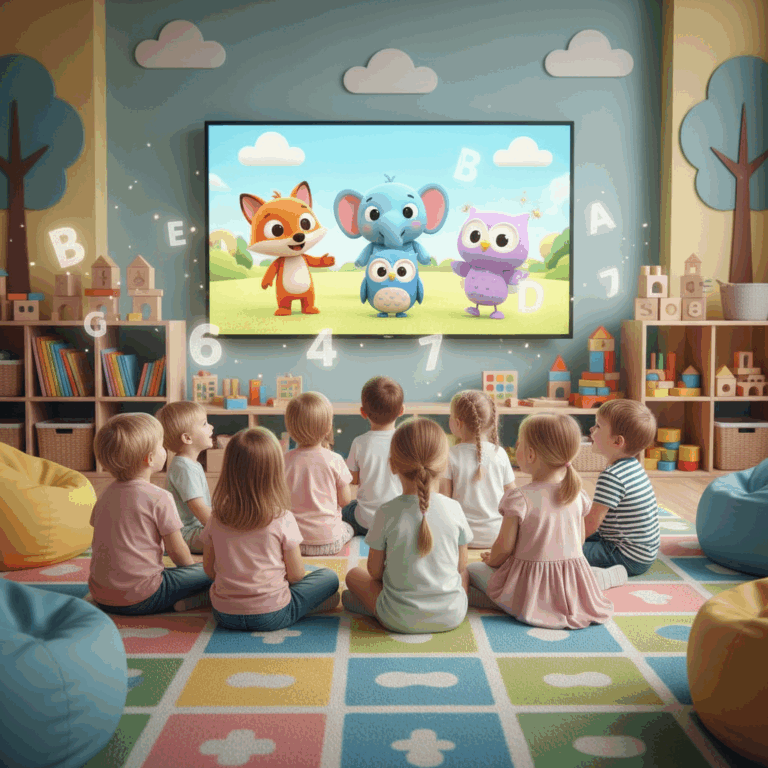Educational benefits of animated films
Animated films are a powerful tool for learning in young children. Through engaging stories, they convey essential teachings that help in their integral development.
These productions combine fun with the teaching of fundamental values that positively influence the emotional and social formation of the little ones.
In addition, they encourage children's imagination and interest in learning more about the world around them, facilitating meaningful learning in an enjoyable way.
Transmission of fundamental values
Animated films teach key values such as responsibility, respect and sincerity. These lessons are presented clearly, helping children internalize positive behaviors.
Stories like Moana's combine adventure with messages about the importance of family and honesty, essential elements for emotional growth.
These transmitted values help children form a solid foundation for coexistence and respect for others in their daily environment.
Combination of entertainment and learning
One of the biggest advantages of animated films is that they mix entertainment with educational content. This keeps children interested while learning valuable lessons.
The visual and musical format facilitates the understanding and retention of messages, making learning a natural and fun process.
Thus, children enjoy cinema while developing emotional and social skills essential for their well-being.
Recommended movies for different ages
Selecting films suitable for each stage of child development is crucial to maximizing their educational benefits. Adapting content to age ensures that children better understand and assimilate messages.
Furthermore, taking into account emotional maturity allows you to avoid scenes that may be confusing or shocking for small viewers. This promotes a positive and enriching experience.
There are numerous titles designed for different ages that combine fun, values and learning, making it easier for children to enjoy and grow with animated films.
Options for children from three years old
For children from three years old, it is recommended to choose movies with simple stories and bright colors that capture their attention without being too complex. These options encourage empathy and fun.
Movies like Trolls and Ponyo on the cliff they are ideal at this stage. They stimulate the imagination and transmit values such as friendship and respect, presented in accessible language.
We also find Moana, which teaches responsibility and family unity through a story full of happy music and endearing characters, perfect for this age.
Movies suitable for ages four and up
From the age of four, children can enjoy titles with slightly more elaborate plots and deeper messages about emotions and relationships. This age allows us to address topics that encourage reflection.
Recommended examples include Ballerina, which inspires perseverance in the search for dreams, and ET the alien, which promotes friendship and care for others.
However, some movies like E.T. they require adult supervision due to intense emotional scenes, so that the child can adequately process the situations shown.
Titles that require adult support
Adult accompaniment is essential in films that address sensitive topics or have scenes that can generate fear or confusion in children. Parents help contextualize and discuss the content.
Movies like ET the alien or Big Hero 6 they deal with complex emotions such as loss and grief, so the presence of an adult is key to providing emotional support.
Furthermore, the guidance of an adult allows you to better take advantage of the educational potential, promoting conversations that reinforce the values and learning transmitted by the film.
Educational topics addressed in the films
Animated films not only entertain, but address essential educational topics that aid in the emotional and social development of young children.
These contents encourage children to understand values and skills that will be useful to face challenges and relationships in their daily lives.
Thanks to creative approaches, children can learn about emotions, social behavior, curiosity and perseverance in an enjoyable and accessible way.
Social and emotional values
Educational films highlight values such as friendship, respect and empathy, fundamental for the coexistence and emotional well-being of young children.
For example Big Hero 6 teaches about managing intense emotions and the importance of support in difficult times, reinforcing resilience.
Titles like Zootopia they promote inclusion and understanding of diversity, helping children accept differences and respect others.
Thus, these social and emotional values are integrated naturally, favoring the formation of healthy and positive relationships from an early age.
Development of curiosity and perseverance
Animated stories stimulate children's curiosity and motivate children to explore the world with enthusiasm and creativity from a young age.
Movies like Small Foot they drive perseverance by showing characters who overcome obstacles with effort and courage, inspiring children not to give up.
This educational approach encourages active learning, helping children develop self-confidence and face challenges with a positive attitude.
Tips for proper selection
Selecting appropriate animated films involves considering the age and sensitivity of the children. Choosing appropriate titles makes it easier for messages to be understood and valued correctly.
Likewise, it is vital to evaluate the content to ensure that it transmits positive values without exposing children to situations or emotions that they cannot handle.
A reflective process in the choice enriches the experience, transforming it into an opportunity for learning and joint fun.
Consideration of the recommended age
The age recommended in movies is an essential guide to avoid inappropriate or complex scenes. Adapting the content to each stage ensures that the child can understand and enjoy the story.
For example, movies for children ages three and up should not contain complicated themes or scary scenes, while options for adults allow them to address deeper emotions.
Respecting this recommendation protects emotional development and encourages a positive and educational experience.
Importance of adult accompaniment
Accompaniment by an adult during viewing is key, especially in films with sensitive or complex themes. Adults can guide the interpretation of messages and support intense emotions.
This support also promotes dialogue between parents and children, reinforcing learning and clarifying doubts that may arise during or after the film.
In this way, the audiovisual experience becomes an enriching and safe moment for the child, enhancing their understanding and emotional well-being.






